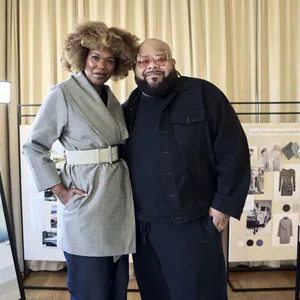As you’re thinking about all of what transpired over the past 12 months, here are some signs that certain things (or people) who are currently in your sphere may need to be significantly realigned or even, shoot…let go of. Ultimately, for your greater good.
1. Your
Mind, Body and Spirit Aren’t in Agreement (About It)
 Giphy
Giphy
I believe I’ve shared before that, back when I was writing my first book, although I adored my editing team overall, it was still a Christian-based one, and so there were a few things that we would clash on. Take the term “human trinity,” for example. They kept wanting me to say something else for fear that it would appear “blasphemous” to certain readers.
Meanwhile, I kept giving pushback because "trinity" is not an actual biblical word. It literally means a group of three or a triad and while that can apply to the Godhead (I John 5:8), nothing is wrong with applying it to other situations and dynamics too...and, to me, the mind, body and spirit of a person equates to what I call their “human trinity” — and something that I oftentimes tell my clients is, “If your mind, body and spirit” are not all in agreement about something (or someone), take heed to that; at the very least, it’s an orange flag, if not a flat-out red one.
So with that said, think about what you have going on in your life right now — if you’re not in a state of complete and total peace concerning everything, is it your mind that feels that way? Is it your body that seems a bit stressed? Is it your spirit that has you unsettled?
Always remember that your being — your mind, body, as well as your spirit — was created to work in harmony, and so, if that isn’t happening about a particular person, place, thing, or idea…you really should pause, ponder, and reflect before making any major moves. Oh, and if two parts of your trinity are struggling, 8/10, that is a sign that you definitely pump the brakes. At least until you figure out why.
2. It’s
Spiritually Compromising You
 Giphy
Giphy
I’m pretty sure that a lot of you have heard the quote, “You don't have a soul, you are a soul; you have a body,” before. If you thought that the writer C.S. Lewis authored it, many people do. Actually, it comes from a man whom he admired by the name of George MacDonald, and yes, it is quite profound when you stop to think about your spirit is the divine part of your being; yes, many consider it to also be your soul (check out “I’ve Got Some Ways For You To Start Pampering Your Soul”).
Since the essence of who you are pretty much comes from the spiritual side of you (check out “What's The Difference Between Being 'Religious' And Being 'Spiritual', Anyway?”), it’s important that you are super intentional about nurturing and nourishing it; this includes keeping safeguards up in order to prevent anyone or anything from compromising you from giving your spirit exactly what it needs to thrive and flourish.
For some of you, you know this means letting go of your partner. For some of you, a toxic friend. For others, it’s really time to find a new career path, shift churches (LISTEN), to move to another location (even if that’s another state or country) or to totally reroute your daily routine — and you know this to be true because your spirit is currently feeling drained and/or bitter and/or resentful and/or confused and/or like you are losing a part of who you are just to keep “it” around.
Sis, it’s not worth it. Compromising yourself at the expense of it costing yourself never EVER is. If what I just said hit really close to home, you’ve still got a few hours to leave it all behind in time for a brand and spanking new year. It might not be easy yet do it anyway. Your spirit deserves it.
3. You’ve
“Hit a/the Ceiling”
 Giphy
Giphy
I ain’t got no lies to tell you — between the orange one in the White House and his uber-maniac ways and AI sinking its teeth deeper and deeper into so many different industries, I definitely think that 2026 is going to be a roller coaster ride for many people as far as the job market is concerned. So, while I am ABSOLUTELY NOT recommending that you flippantly, emotionally, or impulsively quit your job any time soon, I do think that you should ask yourself if you’ve “hit the ceiling” where you are, so that you can possibly plan to look for employment elsewhere or even pivot into something else entirely.
And what are some signs that you have indeed knocked your head up against said ceiling?
- You are bored as hell (or worse, miserable AF) at work
- There is no room for promotion
- Your boss couldn’t care less about your goals or ambitions
- You feel undervalued
- Your skills are underutilized
- There seems to be little to no improvement or progress within the company
- You haven’t received a raise in years
- You procrastinate because you don’t feel motivated or inspired
The fact that most of us spend the majority of our waking hours working, it makes not one bit of sense to be collecting a check at a place that is stressing you out, messing with your psyche and/or is causing you to feel like there’s not much more that life has to offer than, as they say, “paying bills and dying.” If that is what life is like for you right now, although you might not be able to quit this month, it is definitely time to put an exit strategy into place. You know, some say that a whopping 85 percent of people hate their job.
If you are one of them, let’s strive to have that no longer be the case in 2026.
4. There
Is Little-to-No Reciprocity
 Giphy
Giphy
I’m not a fan of transactional dating (check out “Guess What? Dating Was Never Supposed To Be Transactional.” and “Should You Start Off As Friends? Science Says Absolutely.”); anyone who knows me will tell you that. And when guys talk to me about how drained they feel by a woman who seems to only take and not give (for instance, someone just talked to me about how his girlfriend of three years gave him a $20 gift card; meanwhile, he purchased her seven different presents…and she actually makes more money than he does — SMDH), I will oftentimes say, “If there’s no reciprocity, she is a liability.” And I mean it with everything in me.
This goes beyond romantic situations too. Take a friend of mine who, when I tell you that, when it comes to painful situations, she absolutely sucks at being a good support system. I know this because, for the past few weeks, I’ve been telling her that she has a pattern of not showing up in hurtful times and that my patience is wearing thin because I am just the opposite.
She shared with me that she realizes that she doesn’t show up for herself in her own painful moments, and so when something really uncomfortable, trying, or taxing happens to someone else, she tends to retreat instead of reaching out.
In other ways, she’s solid, and so we are working through the matter — but I’ll tell you this: At this point in my life, when I share where I need reciprocit,y and folks don’t want to give it, I have no problem shifting how I prioritize them in my world. Because it makes no sense to call someone “friend” (or partner) and you’re doing most of the work to make that word…relevant.
Bottom line with this one is, if you’re not getting what you need from your relationships — ANY KIND OF RELATIONSHIP — it just might be time to leave certain people behind…now (check out “Why I Don't 'Cut People Off' Anymore, I Release Them Instead”)…so that you have room for who will be willing to show you what reciprocity in relationships looks and feels like.
5. You
Feel “Stuck” in “It”
 Giphy
Giphy
When it comes to the word “stuck,” the definition that I’m coming from here is “to become fastened, hindered, checked, or stationary by some obstruction” — and for the sake of time and space, what I want to amplify is the word “hinder.” One definition of hinder is “to cause delay, interruption, or difficulty in; hamper; impede,” while another is “to prevent from doing, acting, or happening; stop.”
Believe it or not, as a marriage life coach, there are actually clients who I have fired — and the reason was that they were wasting my time. Listen, when you get to the point in your life where you get that there is less time in front of you than behind you, you can’t really put a price tag on your precious moments, so when clients don’t do their homework and/or choose to remain in ridiculous situations (for years at a time) and/or really just want to be coddled instead of getting the tips and tools that they need to make wise decisions on their own — they cause me to feel “stuck” because they aren’t challenging me to be a better coach.
Progress in a client is what makes me better…and so, what I will typically do is put these types of people on probation for about 4-6 months and then release them if they remain in their hamster wheel of cyclic activity (after over a year of working with them).
This is an example of what “stuck” looks and feels like in my life; however, you need to figure out if and how that word may apply to your own. What I can tell you is anything that you know is interrupting or preventing you from doing what you know needs to happen in your world, whether it’s a person, place, thing or idea, you really need to ask yourself if it’s worth holding on to — and if you believe that it is, you definitely should realign your boundaries concerning it or then. Because again, life is too short (and precious) to be “stuck” in something that really isn’t serving you (or serving you any longer).
6. Your
Present and Future Seem Super Foggy with It Around
 Giphy
Giphy
What does this mean? Well, fogginess speaks to things being unclear, right? When it comes to your present, a lack of clarity can speak to feeling/being confused and confusion means that something is going on that either doesn’t make sense to us or is sending us all kinds of mixed messages and signals — and when you continue to dwell in that kind of space, there’s a pretty good chance that your future will be just as…foggy. Just as unclear. Just as confusing.
I’ll explain. Have you ever tried to drive in the fog? You typically can’t see very far ahead, which means that you kind of have to drag along in your car and, even with headlights, sometimes something can run out in front of you, catch you off guard and that can either make your nerves bad or cause you to wreck. Along these same lines, a “foggy situation” can do the same thing — you’ll be out here barely getting anything done because you’re so busy trying to figure out what the hell is going on with it or them…and that usually will cause a domino effect in other areas of your life too.
Sis, it’s not worth it. If you don’t get what’s going on in some area of your world, you’re missing information, you are being gaslit, and/or you are in denial about what is transpiring right before your very eyes. For all of this, purpose to get the answers (clarity) that you seek or leave it behind you.
As an author by the name of Shannon L. Alder once said, “The most confused you will ever get is when you try to convince your heart and spirit of something your mind knows is a lie.” Somebody REALLY needed to hear that today. I hope that you did.
Just in time for another year, and the things that you can feel really good and CRYSTAL CLEAR about.
Welcome to 2026, my dear.
Featured image by Shutterstock


























